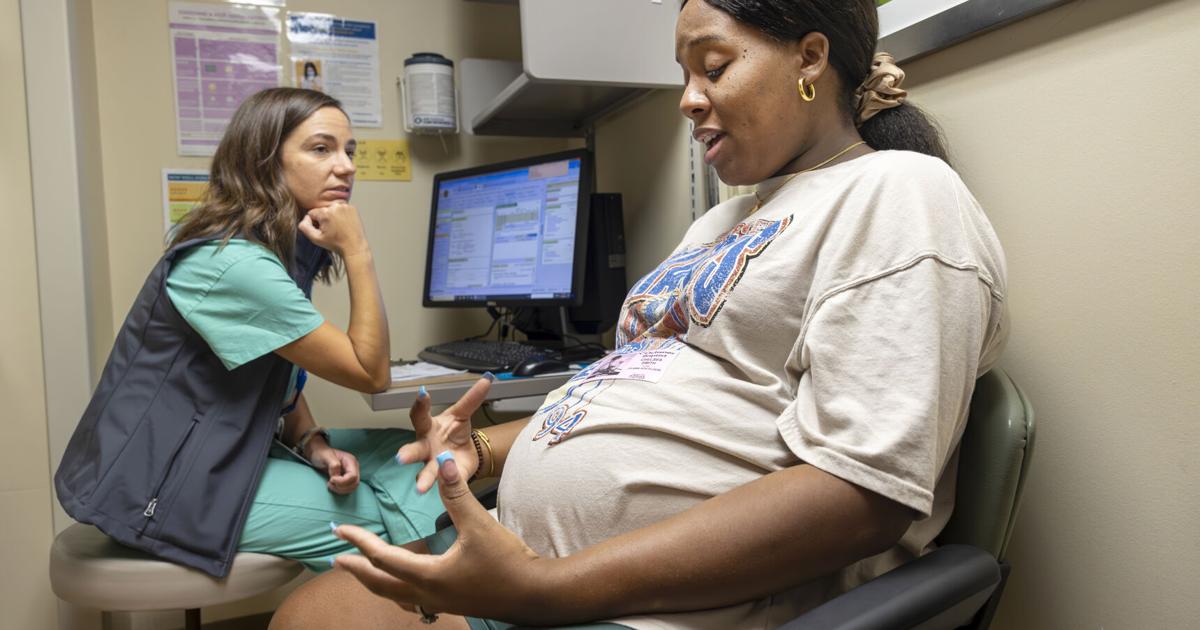Louisiana
Nurse midwives could ease Louisiana’s infant mortality crisis. Why hasn’t the state embraced them?

Not a single doctor provides obstetric care in 17 of Louisiana’s 64 parishes.
And so far, financial incentives to persuade more OB-GYNs to move to rural communities have not changed that stark fact.
Yet even as medical recruiters double salaries and offer signing bonuses, Louisiana is doing little to help attract a group of health care providers who could fill that dangerous gap: certified nurse midwives.
Across the state, Louisiana hospitals are refusing to hire them, despite their extensive credentials. Others will not give them admitting privileges. Louisiana also pays nurse midwives less through Medicaid than many other states.
Dr. Rakhi Dimino, the medical director for OB Hospitalist Group, which hires obstetricians and nurse midwives for hospitals here and nationwide, said that unless the state alters course, “We will never be able to serve all the women who need care.”
The scarcity of nurse midwives is one reason Louisiana has one of the worst infant mortality rates in the developed world, and why mothers often fare no better.
Infants here are 65% more likely to die from being born too early or too small compared to babies in the rest of the country, according to a Times-Picayune | The Advocate analysis of Centers for Disease Control and Prevention data.
Louisiana also has one of the lowest numbers of nurse midwives per capita in the nation: less than 2 for every 100,000 residents. The few who are active here mostly work in parishes where women already have broad access to obstetric care and where their services are less urgently needed.

In many other states, including most places with better birth outcomes, nurse midwives are common in hospitals.
They work alongside OB-GYNs and manage low-risk pregnancies. They can prescribe medicine to manage some medical conditions. They free up doctors to focus on more complicated deliveries and cesarean sections.
It’s important for nurse midwives to work on teams with physicians in hospitals because they cannot perform surgeries like C-sections. But they can provide solid prenatal care and oversee straightforward deliveries, services sorely lacking in parts of the state.
Still, only a handful of hospitals in Louisiana have embraced them.
Among them: Ochsner Health. A team of nurse midwives works on the fourth floor of Ochsner Baptist in New Orleans, known as the Perkin Alternative Birthing Center, and they also attend deliveries two floors above in the hospital’s labor and delivery unit.
Geralyn Beler, right, talks about her pregnancy with Natalie Harvey, a certified nurse midwife with Ochsner Baptist, in New Orleans on Wednesd…
On a recent summer morning, nurse midwife Natalie Harvey had a full slate of patients there for prenatal care. One of them was Geralyn Beler, who was 10 weeks pregnant with her third child.
“You’ve done this before,” Harvey, 38, told Beler.
“Not this way,” responded Beler, also 38, who was new to the practice run by nurse midwives.
Midwives are ‘the expert in normal’
Harvey became a nurse midwife after what felt like an inescapable call to catch babies.
The timing was not ideal: She was 30, ran a business with her husband and had just had her second son. But giving birth was a transformative experience for her, and she felt a strong pull to help other Louisiana mothers, knowing how grim the statistics are.
She already had a mass communication degree. She went back to school for three academic years to become a registered nurse. Then she spent two and a half more becoming a certified nurse midwife, a credential that allows her to deliver babies, provide obstetric and gynecological care and prescribe medicine.
There were no programs in Louisiana offering the degree. She took online coursework with Kentucky-based Frontier Nursing University and had a third son while doing so. She’s now pursuing her doctor of nursing practice.

Geralyn Beler clasps her hands in front of her belly as she talks about her pregnancy with Natalie Harvey, a certified nurse midwife with Ochsner Baptist, in New Orleans on Wednesday, July 26, 2023. (Photo by Chris Granger | The Times-Picayune | NOLA.com)
Nurse midwives generally advocate for few interventions in the absence of complications in birth, so many of their patients choose to forgo epidurals, inductions and other common procedures. A core tenet of their practice is to trust the patient to make her own decisions, and to help educate and empower.
But in setups like Ochsner’s, patients can still deliver with a nurse midwife even if they choose to receive interventions. If a patient wants an epidural, for example, nurse midwives can still attend their delivery on the traditional labor and delivery floor instead of in the birth center, while an anesthesiologist will give the injection.
Nurse midwives work at other Ochsner campuses as well, including in Baton Rouge.
Some evidence suggests states with more midwives have lower rates of preterm birth, low birth weight, C-sections and other types of poor outcomes. But the relationship may be correlative rather than causal: States with more midwives also tend to be those with healthier populations and less poverty.
“Midwives are the expert in ‘normal’: periods, pregnancy, menopause are all normal stages of life for women,” said Michelle Collins, dean of Loyola University’s College of Nursing and Health.
Collins is also a nurse midwife and oversees a new master’s program at Loyola to train more. LSU Health New Orleans also recently started a doctorate program in nurse midwifery. Both say they hope to graduate more students of color to diversify an obstetric workforce that’s overwhelmingly White.
They hope it will change disparities in outcomes: Black infants in Louisiana are 3.6 times more likely to die from premature birth and low birth weight than White infants. And Black mothers are more than twice as likely to die from pregnancy-related complications here than White mothers.
“One of our goals of starting a program here in Louisiana is to have a midwifery population that looks like the population they serve,” said Shannon Pfingstag, a nurse midwife and the LSU Health New Orleans program coordinator.
Louisiana has just 85 licensed and active nurse midwives, though fewer may practice. Most are clustered in New Orleans and Baton Rouge, with a handful in smaller cities like Lafayette and Hammond.
“Having more midwives here in Louisiana is only going to be a positive thing,” Harvey said.
Though nurse midwives must have either master’s or doctoral degrees, Louisiana restricts them in ways that do not apply to less formally educated licensed midwives, who may lack even a bachelor’s degree.
Lack of jobs, low reimbursement rates are barriers
Growing the ranks of nurse midwives is also not as simple as churning out more graduates.
“We can make all the midwives we want, but we have to have physician support and we have to have hospital support,” said Elizabeth Fontenot, a nurse midwife and the clinical director for the Birth Center of Baton Rouge. “We have to have physicians who are hopefully eager to collaborate with us and hospitals who are hopefully eager to hire us.”
Nurse midwifery students are required to get hands-on experience in school under active nurse midwives. But since there are so few practicing in the state, it’s hard to train the next generation.

Natalie Harvey, left, a certified nurse midwife with Ochsner Baptist, talks with patients in New Orleans on Wednesday, July 26, 2023. (Photo by Chris Granger | The Times-Picayune | NOLA.com)
And when nurse midwives treat Medicaid patients in Louisiana, they receive especially low payments. While all providers earn less from Medicaid than they would from Medicare and commercial insurance, the problem is acute for nurse midwives.
For every dollar obstetricians in Louisiana make when they treat Medicare patients, they earn just 66 cents for patients on Medicaid. Nurse midwives in Louisiana have historically received even less than that — 80% of the physician rate.
It plays out like this: An obstetrician whom Medicare paid $1,000 for a specific procedure would receive just $660 for the same procedure under Louisiana’s Medicaid rates. A nurse-midwife would earn just $528 for the same service.
Louisiana has the highest share of births financed by Medicaid of any state.
“It becomes very difficult … to actually make enough money to pay salaries for everybody if you only have reimbursements for Medicaid patients,” Pfingstag said.
Arden Schwenker, the chief financial officer for a national consulting firm called Grow Midwives, said nurse midwives often must see two Medicaid patients to earn as much as they’d get from a single privately insured patient.
This spring, the Legislature upped the Medicaid reimbursement rates for midwives from 80% of the physician rate to 95%.
The lower rate, which had been in place for years, is one of many reasons why Louisiana has long fared poorly on a state-by-state report card on infant and maternal outcomes that the national nonprofit March of Dimes issues annually. In more than half of states, nurse midwives receive the same rate as physicians.
While some researchers argue for equalizing the rates, others say that physicians — who go through far more schooling, plus residency — should earn more for their services.
“As someone who spent eight years becoming a physician and then becoming an OB, I do think there’s some justification for paying a physician more for a delivery,” said Dr. Rebekah Gee, the former state health secretary. “But I don’t think that’s the main barrier [for nurse midwives]. I think it’s the issue of not being welcomed often.”
Gee said she trained with nurse midwives during her residency in Boston and saw firsthand how helpful they can be in normal deliveries and lowering C-section rates.
But while obstetric care has all but disappeared in rural areas, it remains a competitive market in more urban areas, and nurse midwives can be seen as unwelcome competitors.
Credentialing varies among midwives: not all are nurses
While there are many restrictions on nurse midwives in Louisiana, a less rigorously trained variety of midwife, confoundingly, has more flexibility to open practices or birth centers. Those are known as “licensed midwives” or “certified professional midwives.”
These midwives need not be registered nurses, nor are they even required to have college degrees. They can become certified through midwifery schools, which may not be accredited, or learn through apprenticeships. They gain their title by passing a national exam.
When women give birth at home in Louisiana, they’re often attended by these “licensed midwives.” It’s a controversial practice.

Nurse-midwives on the fourth floor of Ochsner Baptist in New Orleans, known as the Perkin Alternative Birthing Center, stand in front of a wall of photos of babies born at the hospital. (Photo by Chris Granger | The Times-Picayune | NOLA.com)
Hospitals and birth centers are the safest locations to give birth, according to the American College of Obstetricians and Gynecologists. The group cites data that says planned home births have more than twice the risk of perinatal death and three times the risk of neonatal seizures or other neurological dysfunction.
Planned home births had a neonatal mortality rate of 13.66 per 10,000 live births, four times the rate for nurse midwife-attended births in hospitals, according to a 2020 study in the American Journal of Obstetrics and Gynecology. Unplanned home births were twice as dangerous as planned ones.
The study concluded that the birth setting was more important than the type of attendant.
Midwives are supposed to take on only low-risk patients with healthy pregnancies. But there are glaring examples where practitioners ignored that guidance, with deadly results.
In 2008, the Louisiana Board of Medical Examiners revoked Kami Dehler’s midwifery license over a botched delivery. Doctors warned the mother she had a high-risk pregnancy, but Dehler still accepted her as a patient for home birth. The mother labored for 54 hours, and her daughter was pronounced brain-dead shortly after birth.
The medical board also found that Dehler had wrongly advertised herself as a “doctor” even though her naturopathic medicine degree was not recognized in Louisiana. Dehler continues to advertise herself as a naturopathic doctor practicing in Covington who focuses on plant-based therapies and holistic healing.
Dehler did not return a message for this story.
Despite the large gaps in formal education between licensed midwives and nurse midwives, the state’s Medicaid regime pays them the same.
Licensed midwives, meanwhile, may open free-standing birth centers in Louisiana without physician input or collaboration, so long as they follow state laws. They must develop a referral system for complicated pregnancies and locate within 30 miles of a hospital that can perform an emergency C-section.
But nurse midwives cannot open birth centers, clinics or even work without a “collaborative practice agreement” with a physician.
Such requirements have long been the subject of debate: The state suspended the rules during the pandemic, but they’ve since been reinstated. About half of states do not require collaborative practice agreements for certified nurse midwives.
Some Louisiana nurse midwives say those rules prevent them from opening practices that could expand access to health care. Their profession often feels called to serve those who have historically lacked access or had bad experiences with the system, according to Collins and Pfingstag.
“Whether there’s a written agreement or not, we always work in a way that we can collaborate with physicians who are able to provide a higher level of care if that’s necessary,” Pfingstag said.
But the American Medical Association has vigorously fought efforts to relax such rules across the country, including in Louisiana. They say patients prefer physician-led care and point out that advanced practice nurses still have far less training than doctors.
The AMA also disputes the notion that states could eliminate health care deserts if nurse practitioners were given the unfettered ability to practice. In states without collaborative practice requirements, many places still lack practitioners.
“Laws that expanded the scope of practice for nonphysicians have not correlated to increased number of nonphysicians moving into those rural areas,” said Kimberly Horvath, a senior attorney with the AMA, in a policy brief.
A 2017 Journal of Health Economics study found few differences in maternal and infant health outcomes between states that more strongly restrict nurse midwives and those where they have full practice authority. The authors deemed the restrictions on certified nurse midwives “neither helpful nor harmful” for outcomes, but said states without the restrictions had lower rates of induced labor and C-sections.
Those states, however, often have lower rates of chronic health conditions to begin with. In states like Louisiana, high rates of chronic health problems often lead to high-risk pregnancies, making C-sections more common.
Physician shortages affect the whole state
While Louisiana’s high rates of infant and maternal mortality underscore the need for a stronger obstetric workforce, those statistics might also chase away some potential providers.
“Physicians obviously care a lot about their patients, and they want to practice in a place where they will have minimal casualties,” said Cody Futch, vice president of recruiting for Dallas-based AMN Healthcare’s physicians solutions division.
He said it’s a chicken-or-egg question.
“The maternal mortality rates may be high because of a lack of providers,” Futch said. “And it may, in turn, perpetuate that lack of providers.”
Ideally, experts say, Louisiana would have broad coverage from a range of providers: maternal-fetal medicine specialists, OB-GYNs and nurse midwives, who can each treat different levels of pregnancy-related complications.
But that’s not happening.

Natalie Harvey, a certified nurse midwife with Ochsner Baptist, makes a bed in one of the patient rooms in New Orleans on Wednesday, July 26, 2023. Increasing the number of nurse-midwives in Louisiana is one way that the state can improve birth outcomes and fill gaps in maternity care deserts. (Photo by Chris Granger | The Times-Picayune | NOLA.com)
Dimino said her group had to resort to hiring out-of-state OB-GYNs to help staff Beauregard Health System in rural DeRidder because they could not persuade doctors to move there. They fly the physicians in from Texas for five days at a time before swapping them out.
Futch noted that OB-GYNs are in high demand and often have options in cities with better amenities. And even for those willing to live in rural areas, practicing without support from other clinicians can be both daunting and exhausting.
“The smaller the community, the less subspecialty support OB-GYNs have,” Futch said. “If you’re in New Orleans, you have (maternal-fetal medicine) specialists; you have Children’s Hospital if you have complications with a newborn.”
Dimino said OB Hospitalist Group has struggled to attract physicians to Louisiana in general, including in Baton Rouge, East Jefferson, Lafayette, Shreveport and Alexandria.
The difficulty of recruiting physicians to north Louisiana, which has the highest rates of infant mortality in the state, is especially acute, said Dr. Dani Zoorob, the OB-GYN chair for Ochsner LSU Health Shreveport.
“There is a significant shortage on the physician side as well as the nursing side,” Zoorob said. “I would love if we can get more doctors in this area to try to help us address our patients’ needs.”
Programs that offer to help eliminate student debt could help, Futch said. He also said states could incentivize physicians who have trained in other countries to work in rural areas by offering them permanent resident status.
Recruitment has also become more difficult in states with strong abortion restrictions, like Louisiana, in the wake of the U.S. Supreme Court’s ruling in the Dobbs case last year, Futch said. He said that’s not necessarily because physicians support abortion, but that they worry about practicing in an environment where politicians are threatening to prosecute them as they make emergency decisions about how to save mothers if their pregnancy becomes life-threatening.
“Providers are scared to intervene for things like miscarriage because the procedure you would do for a miscarriage is very similar to the procedure you would do for an elective abortion,” Gee said. “So there’s a lot of fear just to do well-woman care.”

Louisiana
Hoover passes for 4 TDs as TCU beats Louisiana-Lafayette in the New Mexico Bowl

Josh Hoover passed for four touchdowns to help TCU beat Louisiana-Lafayette 34-3 on Saturday in the New Mexico Bowl.
Hoover was 20 for 32 for 252 yards with an interception. Eric McAlister had eight catches for 87 yards and a TD for the Horned Frogs (9-4).
TCU’s defense also had a solid day, holding Louisiana-Lafayette (10-4) to 209 yards, including 61 on the game’s final possession.
Ben Wooldridge was 7-for-20 passing for 61 yards for the Ragin’ Cajuns. He also threw an interception.
The Horned Frogs put together a fast start. Hoover found DJ Rogers for a 3-yard TD pass, capping an 11-play, 75-yard drive on the game’s opening possession.
After Lou Groza Award winner Kenneth Almendares missed a 54-yard field goal for Louisiana-Lafayette, TCU went right back to work.
McAlister’s 1-yard touchdown reception finished a 10-play, 63-yard drive and gave the Horned Frogs a 14-0 lead in the first quarter.
Kyle Lemmermann kicked two field goals and JP Richardson added a 20-yard touchdown reception as TCU opened a 27-0 halftime lead.
Takeaways
TCU: Two years removed from an appearance in the national championship game, the Horned Frogs turned in a strong performance after going 5-7 last season. They scored on their first four possessions against the Cajuns. and held a 27-0 halftime lead.
Louisiana-Lafayette: It was a rough afternoon for the Cajuns. Almendares made a 24-yarder in the fourth quarter to account for their only points.
UP NEXT
TCU opens the 2025 season Aug. 30 at North Carolina in coach Bill Belichick’s debut with the Tar Heels.
Louisiana-Lafayette opens at home against Rice on Aug. 30.
Louisiana
Why did Marshall opt out of bowl game? Explaining Louisiana Tech’s Independence Bowl berth

Does Boise StateCFP first-round winners with the best shot at the semifinals | or Arizona State have a better CFP chance? | Before The Snap
Texas, Ohio State, Penn State or Notre Dame: Before The Snap looks at which College Football Playoff first-round winners could advance to the semis.
Army football is set to face Louisiana Tech in the Independence Bowl on Saturday night. It’s the second team the Black Knights have been slated to play this bowl season.
No. 18 Army (11-2) was originally slated to play Marshall after winning the American Athletic Conference, however, the Thundering Herd opted out of the bowl game, allowing for the Bulldogs (5-7) to reach the postseason despite not reaching the typical 6-win threshold.
Army, coming off a loss to arch-rival Navy, is looking to reach 12 wins for the first time in program history. Quarterback Bryson Daily, who finished sixth in Heisman Trophy voting, had one of the best seasons ever for the Black Knights, scoring 38 total touchdowns with a team-leading 1,532 rushing yards.
There are numerous reasons as to why Army won’t be taking on Marshall, who went 10-3 this season and won the Sun Belt championship.
Here’s an explanation of Army’s opponent in the Independence Bowl on Saturday:
Why is Army playing Louisiana Tech instead of Marshall?
Marshall backed out of the Independence Bowl in wake of coach Charles Huff leaving for the Southern Miss job, which resulted in numerous Thundering Herd players entering the transfer portal.
Marshall simply was left with hardly a roster and no head coach, resulting in the opt out.
Yahoo Sports’ Ross Dellenger reported Louisiana Tech was selected as the replacement due to its Academic Progress Rate despite not reaching the 6-win bowl eligibility threshold. Dellenger added multiple 5-win teams had better APR than Louisiana Tech, however, were unable to commit to the game based on the short turnaround of the matchup after Marshall’s opt out.
Why did Marshall opt out of bowl game?
Marshall opted out of the game due to having a substantial number of players enter the transfer portal following Huff’s departure to Southern Miss.
The Thundering Herd had over 25 players enter the transfer portal, including all three of their scholarship quarterbacks.
“It is unfortunate that Marshall determined they won’t be able to compete in the bowl in a couple of weeks,” Independence Bowl executive director Missy Setters said in a statement. “Our goal was to create the best matchup possible for our local fans and college football fans throughout the country, and we think we did that with two conference champions. Moving forward we are very excited to host Louisiana Tech and are thrilled we found an opponent for Army.”
According to On3’s transfer portal database, Marshall has lost 45 players to the transfer portal this offseason.
Why is Louisiana Tech in Independence Bowl?
Louisiana Tech was the replacement for Marshall, who opted out of the Independence Bowl due to losing a large group of players to the transfer portal.
Louisiana Tech was then selected due to its Academic Progress Rate, despite not having the highest among 5-win teams. The Bulldogs (5-7) didn’t reach the 6-win bowl threshold, but were picked since there were no 6-win teams left to choose from.
Louisiana Tech’s APR was also not the highest among 5-win teams, but was selected after multiple teams in front of it in the pecking order couldn’t commit to the game with the short turnaround after Marshall’s opt out.
Louisiana
Louisiana Tech vs. Army: Predictions, latest odds for Independence Bowl

From NFL to NCAA: The biggest sports controversies of 2024
Reporters from USA Today share what they think the biggest controversy in sports was in 2024.
Sports Seriously
The college football bowl action continues with the Radiance Technologies Independence Bowl featuring the Louisiana Tech Bulldogs facing off against the Army Black Knights.
Stepping in to replace Marshall after it pulled out due to outside factors, Louisiana Tech has shown remarkable resilience. Despite a tough season, finishing 5-7 and fifth in Conference USA, the Bulldogs have not backed down. They are led by freshman quarterback Evan Bullock, who boasted a 67.4% completion rate for 1,938 yards, 14 touchdowns, and only two interceptions. Bullock has a strong target in wide receiver Tru Edwards, who led CUSA in receptions (77) and recorded 897 receiving yards with six touchdowns.
Louisiana Tech is set to face a challenging opponent in Army, which recently made history by winning its first AAC championship game. This marks a significant milestone in the program’s 134-year history after an impressive 11-2 season. The Black Knights are guided by senior quarterback Bryson Daily, who is a formidable presence both on the ground and through the air. Last season, Daily passed for 942 yards and nine touchdowns, while also throwing four interceptions. Additionally, he rushed for an impressive 1,532 yards, scoring a remarkable 29 touchdowns.
Here’s everything you need to know ahead of the Independence Bowl.
Independence Bowl predictions: Louisiana Tech vs. Army
USA TODAY Sports: Army is unanimous pick
- Scooby Axson: Army
- Jordan Mendoza: Army
- Paul Myerberg: Army
- Erick Smith: Army
- Eddie Timanus: Army
- Dan Wolken: Army
ESPN: Army 23, Louisiana Tech 16
Adam Rittenberg writes: “The Independence Bowl has a new participant and a different/more local flavor, as Marshall opted out following its coaching change and portal exodus, and Louisiana Tech stepped in as the replacement, and will make the short drive from Ruston to Shreveport. The Bulldogs have half the number of wins as the Thundering Herd, but their defense can be very stingy at times, and will need to perform against Bryson Daily and the Black Knights. Although Louisiana Tech coach Sonny Cumbie said, “The band’s back together,” the Bulldogs will be without several defensive linemen who went into the transfer portal. Army is undoubtedly still smarting from the Navy loss, and top running back Kanye Udoh entered the portal. Louisiana Tech jumps ahead early behind quarterback Evan Bullock, but Army eventually takes control and grinds out a low-scoring win, its 12th on the season.”
College Football Network: Army 35, Louisiana Tech 13
James Fragoza writes: “The Black Knights’ 2024 campaign has been one for the books, highlighted by their physical dominance and a well-executed option attack. While a 49-14 rout at the hands of playoff-bound Notre Dame and a 31-13 upset loss to Navy stand out as blemishes, they’re hardly disqualifying. Navy, after all, is a nine-win squad with an efficient offense – a far cry from what Louisiana Tech brings to the table. The Black Knights, even after failing to cover as double-digit favorites in their last two outings, still present a clear mismatch for a Bulldogs team that managed just one win over an FBS opponent with a winning record this year. For Louisiana Tech, this matchup feels less like an opportunity and more like a buzzsaw, especially due to its transfer portal losses.”
Tickets to the Independence Bowl with StubHub
Independence Bowl odds, lines: Louisiana Tech vs. Army
The Army Black Knights are favorites to defeat the Louisiana Tech Bulldogs, according to the BetMGM college football odds.
Odds as of Friday, Dec. 27.
- Spread: Army (-14)
- Moneylines: Army (-800); Louisiana Tech (+500)
- Over/under: 44.5
How to watch Louisiana Tech vs. Army in the Independence Bowl
- Date: Saturday, Dec. 28
- Time: 9:15 p.m. ET
- TV: ESPN
- Stream: Fubo
- Where: Independence Stadium (Shreveport, Louisiana)
We occasionally recommend interesting products and services. If you make a purchase by clicking one of the links, we may earn an affiliate fee. USA TODAY Network newsrooms operate independently, and this doesn’t influence our coverage.
-
/cdn.vox-cdn.com/uploads/chorus_asset/file/24924653/236780_Google_AntiTrust_Trial_Custom_Art_CVirginia__0003_1.png)
/cdn.vox-cdn.com/uploads/chorus_asset/file/24924653/236780_Google_AntiTrust_Trial_Custom_Art_CVirginia__0003_1.png) Technology1 week ago
Technology1 week agoGoogle’s counteroffer to the government trying to break it up is unbundling Android apps
-

 News1 week ago
News1 week agoNovo Nordisk shares tumble as weight-loss drug trial data disappoints
-

 Politics1 week ago
Politics1 week agoIllegal immigrant sexually abused child in the U.S. after being removed from the country five times
-

 Entertainment1 week ago
Entertainment1 week ago'It's a little holiday gift': Inside the Weeknd's free Santa Monica show for his biggest fans
-

 Lifestyle1 week ago
Lifestyle1 week agoThink you can't dance? Get up and try these tips in our comic. We dare you!
-
/cdn.vox-cdn.com/uploads/chorus_asset/file/25672934/Metaphor_Key_Art_Horizontal.png)
/cdn.vox-cdn.com/uploads/chorus_asset/file/25672934/Metaphor_Key_Art_Horizontal.png) Technology4 days ago
Technology4 days agoThere’s a reason Metaphor: ReFantanzio’s battle music sounds as cool as it does
-

 News6 days ago
News6 days agoFrance’s new premier selects Eric Lombard as finance minister
-

 Business4 days ago
Business4 days agoOn a quest for global domination, Chinese EV makers are upending Thailand's auto industry



















